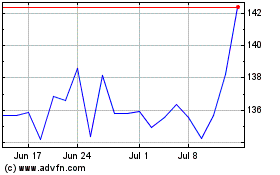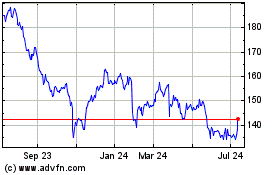UPS to Freeze Pension Plans for Nonunion Staffers -- 2nd Update
June 27 2017 - 1:54PM
Dow Jones News
By Paul Ziobro and Vipal Monga
United Parcel Service Inc. is planning to freeze pension plans
for about 70,000 nonunion employees, seeking to contain the burden
of a retirement fund with a nearly $10 billion deficit.
The package carrier would be the latest major U.S. corporation
taking steps to corral rising pension obligations. The collective
deficit in the S&P 1500 pension plans totaled $408 billion at
the end of last year, according to consulting firm Mercer.
UPS has more than 434,000 workers world-wide, with more than 80%
in the U.S. Most of them are unionized. The company is expected to
outline changes to nonunion staff as soon as Tuesday, people
familiar with the matter said.
A UPS spokesman declined to comment. The company closed the
pension plan to new hires in July 2016 and offered buyouts to
former workers last year. Freezing a pension plans means that some
of the benefits stop accruing for some or all plan
participants.
Such an action would put UPS in line with a wide swath of
Corporate America. In 2014, 37% of Fortune 500 companies with
defined benefit plans had frozen them in some way, compared with
35% with open plans, according to the consultancy Willis Towers
Watson. As recently as 2010, half of large companies with defined
benefit plans were open.
Atlanta-based UPS is trying to make a dent in a U.S. pension
deficit that reached $9.85 billion at the end of 2016, according to
its annual report. The plan, with $41.07 billion in obligations,
was 76% funded at that point, down from nearly 90% at the end of
2013.
UPS's pension struggles mirror broader funding problems among
companies that offer retirement benefits. The median S&P 1500
pension plan's funded status was 76% at the end of 2016, according
to a Citigroup Global Markets Inc. report.
Companies are required by law to close those gaps over time, but
the deficits have persisted, even though S&P 1500 firms
collectively have contributed more than $550 billion into the plans
from 2008 to 2016.
The continuing cash drain is encouraging more executives to look
for ways to stem the bleeding. "This costs a lot of cash, and the
cash hasn't resulted in a better funded status," said Jason
Richards, pension risk consultant at Willis Towers Watson.
Companies that freeze their pensions can later offer lump-sum
payouts to active employees and potentially spin them off entirely
to third parties, he explained. Those options aren't available to
plans that continue to accrue obligations to workers.
General Motors Co., Verizon Communications Inc. and others have
sold large pension obligations to insurers in recent years, as part
of a multistep process that included freezing pension plans.
Earlier this week, financial-services firm The Hartford offloaded
$1.6 billion of its pension to Prudential Financial Inc.
Last year, UPS offered buyouts to all former UPS employees who
were vested in the pension plan. Around 22,000 accepted the deal,
accelerating $685 million in pension benefits that were due last
year.
The latest move by UPS could prove to be a key element in coming
negotiation with the powerful International Brotherhood of
Teamsters union, which represents 268,000 UPS drivers and other
workers. The national master agreement expires July 31, 2018, and
talks on renewals are expected to begin later this year.
Vipal Monga contributed to this article.
Write to Paul Ziobro at Paul.Ziobro@wsj.com and Vipal Monga at
vipal.monga@wsj.com
(END) Dow Jones Newswires
June 27, 2017 13:39 ET (17:39 GMT)
Copyright (c) 2017 Dow Jones & Company, Inc.
United Parcel Service (NYSE:UPS)
Historical Stock Chart
From Mar 2024 to Apr 2024

United Parcel Service (NYSE:UPS)
Historical Stock Chart
From Apr 2023 to Apr 2024
